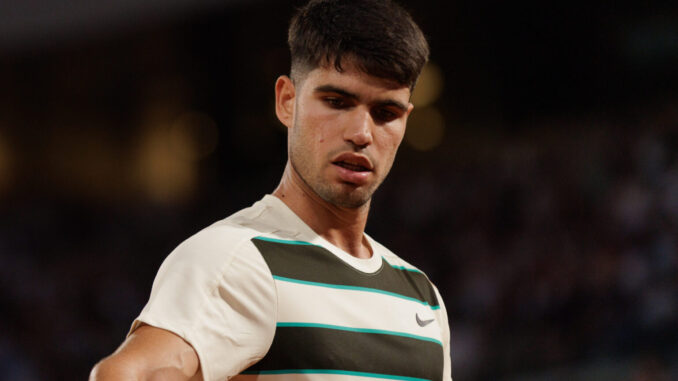
Carlos Alcaraz, the 22-year-old Spanish sensation and defending French Open champion, has once again electrified Roland Garros with his explosive play, securing his place in the fourth round of the 2025 tournament. However, a recurring flaw—lapses in concentration—has resurfaced, casting a shadow over his quest to become the first man since Rafael Nadal in 2020 to retain the title. As Alcaraz prepares to face American Ben Shelton in a highly anticipated clash, his tendency to lose focus at critical moments has already cost him two sets and valuable energy, potentially jeopardizing his chances in the grueling second week of the Grand Slam.
Alcaraz’s 2025 French Open campaign began with a commanding 6-3, 6-4, 6-2 victory over Italian qualifier Giulio Zeppieri, where he saved all three break points faced and maintained control throughout. “It was really, really solid,” Alcaraz said, radiating confidence. “Really proud about my start.” Yet, his next matches revealed cracks in his mental armor. Against Hungary’s Fabian Marozsan in the second round, Alcaraz dropped the second set in a 6-1, 4-6, 6-1, 6-2 win, admitting his opponent’s aggressive play disrupted his rhythm. “In the second set, he started to play much better and he was really aggressive. He didn’t miss at all so it was a little difficult to deal with his game,” he noted. The third round against Bosnia’s Damir Dzumhur was even more troubling, as Alcaraz squandered a two-set lead, falling 4-6 in the third set before rallying to close out a 6-1, 6-3, 4-6, 6-4 victory. “I suffered quite a lot today,” he confessed. “The first two sets were under control, then he started to play more deeply and more aggressively. It was really difficult for me.”
These lapses echo Alcaraz’s 2024 French Open run, where he dropped five sets en route to the title, including two in his semifinal thriller against Jannik Sinner, which he won 2-6, 6-3, 3-6, 6-4, 6-3. That match, a showcase of Alcaraz’s resilience, saw him overcome a 2-1 deficit by finding another gear, but it came at a cost. “We saw it last year. It sort of happened. Down two sets to one against Sinner and Zverev and then he figures things out,” a former player observed. “But he spends three hours 14 minutes on court instead of two hours 14 minutes and been in bed by 1 o’clock rather than 3 o’clock. These are things which make a huge difference in a Grand Slam tournament.” Alcaraz’s average match time at the 2025 French Open—3.7 sets and over three hours per match—trails only Novak Djokovic among top contenders, while Sinner, the world No. 1, has yet to drop a set, averaging just over two hours per match.
The root of Alcaraz’s struggles lies in his shot selection and intensity, which wane during critical moments. Against Dzumhur, leading comfortably by two sets, his focus faltered, allowing the 33-year-old Bosnian, who had never advanced past a major’s third round, to claw back. Dzumhur’s aggressive shift, moving forward to finish points, exposed Alcaraz’s tendency to ease off, a pattern also evident in his 2023 semifinal loss to Djokovic, where mental tension and cramps derailed him. “The tension of the match. I started really nervous,” Alcaraz reflected on that 2023 defeat, a lesson he’s yet to fully master. His aggressive forehand, a hallmark of his game, becomes less effective when his focus drifts, leading to unforced errors and prolonged rallies that sap his energy.
As Alcaraz faces Shelton, a powerful 22-year-old American making his first fourth-round appearance at Roland Garros, the stakes are high. “Playing the defending champion, round of 16, I’m guessing center court, that’s a pretty cool opportunity,” Shelton said, relishing the challenge. Alcaraz leads their head-to-head 2-0, but their previous encounters were on hard courts, and clay’s slower surface may test his patience further. With Sinner looming as a potential final opponent, Alcaraz’s ability to maintain focus will be crucial. His 17-1 clay record this year, bolstered by titles in Monte Carlo and Rome, underscores his dominance when locked in, but the second week demands consistency. “That’s why it’s difficult to win Grand Slams because you have to maintain your focus over three or four hours,” Alcaraz acknowledged. As he navigates a draw that includes American hopefuls like Tommy Paul and Frances Tiafoe, Alcaraz must conquer his mental lapses to keep his title defense alive, or risk paying a steep price in Paris.
Leave a Reply